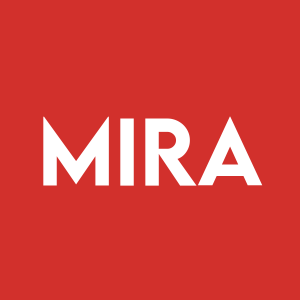MIRA Pharmaceuticals Reveals Preclinical Success: Ketamir-2 Optimized for Brain Delivery, Avoiding Ketamine's Drug Resistance
Rhea-AI Summary
MIRA Pharmaceuticals (NASDAQ:MIRA) has announced promising preclinical results for Ketamir-2, its novel oral ketamine analog. The drug shows potential advantages over traditional ketamine for treating neurological and neuropsychiatric disorders. Key findings include:
1. Better brain penetration due to non-interaction with P-glycoprotein
2. Higher oral bioavailability (80% vs. <30% for ketamine)
3. Improved safety profile with no hyper-locomotor activity or mu-opioid receptor interaction
4. Significant anti-depressive and anxiolytic effects in mouse models
MIRA aims to submit an IND application to the FDA by year-end for human testing. The company is also exploring orphan drug indications for conditions like multiple sclerosis-induced depression and Huntington's disease-induced depression.
Positive
- Ketamir-2 shows better brain penetration than traditional ketamine
- Higher oral bioavailability of 80% compared to less than 30% for ketamine
- Improved safety profile with no hyper-locomotor activity or mu-opioid receptor interaction
- Significant anti-depressive and anxiolytic effects demonstrated in mouse models
- Potential for lower dosing due to improved tissue penetration
- Exploring orphan drug status for multiple indications
- IND application planned for submission to FDA by end of 2024
Negative
- Ketamir-2 is still in preclinical stage, with no human trials conducted yet
- Potential regulatory hurdles and delays in IND approval process
News Market Reaction 1 Alert
On the day this news was published, MIRA gained 627.35%, reflecting a significant positive market reaction.
Data tracked by StockTitan Argus on the day of publication.
New findings highlight potential advantages of MIRA's novel oral ketamine analog for treating neurological and neuropsychiatric disorders
MIAMI, FL / ACCESSWIRE / July 22, 2024 / MIRA Pharmaceuticals, Inc. (NASDAQ:MIRA) ("MIRA" or the "Company"), a leading pre-clinical-stage pharmaceutical company, today announced new preclinical study results for its novel oral ketamine analog, Ketamir-2.
The additional data announced today continues a string of promising preclinical results announced by MIRA in recent months for Ketamir-2 as MIRA works towards its goal of submitting an Investigational New Drug (IND) application to the U.S. Food and Drug Administration (FDA) by the end of this year which, if granted, would allow for human testing of Ketamir-2.
Ketamir-2 is under investigation for its potential in treating neurological and neuropsychiatric disorders, including depression, treatment-resistant depression (TRD), and post-traumatic stress disorder (PTSD).
Ketamir-2: Brain Penetration and Therapeutic Potential
Ketamir-2 has demonstrated in in vitro studies that it is not a substrate for interaction with P-glycoprotein (P-gp), a membrane protein that typically pumps many drugs out of cells, including cells located in the brain. This characteristic might allow Ketamir-2 to have a better oral absorption and to penetrate the blood-brain barrier more effectively than traditional ketamine, which is a substrate of P-gp.
Key Areas of Recent Data Investigation:
Patient Compliance and Convenience:
Traditional ketamine requires intravenous (IV) administration, necessitating hospital visits and medical supervision. As an oral formulation, Ketamir-2 could potentially offer greater convenience and improved patient compliance if further studies confirm these benefits.
Brain Penetration:
P-gp is highly expressed in the blood-brain barrier and limits the entry of many drugs into the central nervous system. Studies have shown that Ketamir-2's non-substrate status for P-gp may allow better brain penetration.
Drug Resistance:
P-gp also plays a role in multidrug resistance (MDR), particularly in cancer cells. Ketamir-2, not being a substrate of P-gp, is therefore potentially less susceptible to this resistance.
Bioavailability:
P-gp further limits drug absorption in the intestines by pumping drugs back into the intestinal lumen. MIRA's preclinical research indicates that Ketamir-2 exhibits better oral bioavailability, which could ensure higher efficacy at lower doses compared to traditional ketamine.
Potential for Lower Dosing:
MIRA's preclinical also suggest that improved penetration into target tissues would allow for lower doses of Ketamir-2 to achieve therapeutic effects.
Preclinical Results and Ongoing Research:
MIRA previously announced that Ketamir-2's oral bioavailability is predicted to be around
Recent studies further highlight Ketamir-2's anti-depressive and anxiolytic effects in a mouse model, with significant improvements in behavioral tests compared to traditional ketamine.
Expanding Indications and Exploring Orphan Drug Status:
Building on these promising preclinical results, MIRA has additional ongoing preclinical studies to demonstrate Ketamir-2's potential efficacy in treating chemotherapy-induced depression and cancer-related neuropathic pain. Due to its novel chemical profile, MIRA is exploring options for orphan drug indications such as multiple sclerosis-induced depression and Huntington's disease-induced depression. Models are being developed to validate these designations and ongoing studies have been designed to help support these efforts.
Erez Aminov, Chairman & CEO of MIRA Pharmaceuticals, stated, "Our vision at MIRA is to transform the treatment landscape for neurological and neuropsychiatric disorders. Ketamir-2 shows great promise in addressing these debilitating conditions with improved efficacy and safety, offering new hope and better quality of life for patients and their families. Importantly, we are seeing a drumbeat of promising data this year that we hope will allow us to file an IND and begin to test our theories about Ketamir-2 in actual patients in the near term."
Dr. Itzchak Angel, Chief Scientific Advisor of MIRA Pharmaceuticals, added, "Our findings on Ketamir-2 underline its potential as a groundbreaking treatment for mental health disorders. We are committed to advancing Ketamir-2 towards clinical trials and making this innovative treatment available to patients in need."
About MIRA Pharmaceuticals
MIRA Pharmaceuticals, Inc. (NASDAQ:MIRA) is a pre-clinical-stage pharmaceutical development company with two neuroscience programs targeting a broad range of neurologic and neuropsychiatric disorders. MIRA holds the exclusive U.S., Canadian and Mexican rights for Ketamir-2, a novel, patent pending oral ketamine analog under investigation to potentially deliver ultra-rapid antidepressant effects, providing hope for individuals battling treatment-resistant depression, major depressive disorder with suicidal ideation and post-traumatic stress disorder. The U.S. Drug Enforcement Administration's scientific review of Ketamir-2 concluded that it would not be considered a controlled substance or listed chemical under the Controlled Substances Act and its governing regulations.
In addition, MIRA's novel oral pharmaceutical marijuana analog, MIRA-55, is currently under investigation for treating adult patients suffering from neuropathic pain as well as anxiety and cognitive decline, often associated with early-stage dementia. MIRA-55, if approved by the FDA, could mark a significant advancement in addressing various neuropsychiatric, inflammatory, and neurologic diseases and disorders. The U.S. Drug Enforcement Administration's scientific review of MIRA-55 concluded that it would not be considered a controlled substance or listed chemical under the Controlled Substances Act and its governing regulations. Additional information about the Company is available at: www.mirapharmaceuticals.com
Ketamir-2 and MIRA-55 are in early-stage preclinical development. There is no assurance that the products will proceed through development or will receive FDA approval for marketing.
Cautionary Note Regarding Forward-Looking Statements
This press release and the statements of the Company's management related thereto contains "forward-looking statements," which are statements other than historical facts made pursuant to the safe harbor provisions of Section 27A of the Securities Act of 1933, as amended, and Section 21E of the Securities Exchange Act of 1934, as amended. These statements may be identified by words such as "aims," "anticipates," "believes," "could," "estimates," "expects," "forecasts," "goal," "intends," "may," "plans," "possible," "potential," "seeks," "will," and variations of these words or similar expressions that are intended to identify forward-looking statements. Any statements in this press release that are not historical facts may be deemed forward-looking. These forward-looking statements include, without limitation, statements regarding the anticipated benefits of the study results described herein as well as the timing for the Company's other preclinical studies and the filing of an IND for Ketamir-2. Any forward-looking statements in this press release are based on the Company's current expectations, estimates and projections only as of the date of this release and are subject to a number of risks and uncertainties (many of which are beyond the Company's control) that could cause actual results to differ materially and adversely from those set forth in or implied by such forward-looking statements. These and other risks concerning the Company's programs and operations are described in additional detail in Annual Report on Form 10-K for the year ended December 31, 2023 and other SEC filings, which are on file with the SEC at www.sec.gov and the Company's website at https://www.mirapharmaceuticals.com/investors/sec-filings. The Company explicitly disclaims any obligation to update any forward-looking statements except to the extent required by law.
For further information, please contact:
MIRA Pharmaceuticals, Inc.
Info@mirapharma.com
(786) 432-9792
SOURCE: MIRA Pharmaceuticals
View the original press release on accesswire.com






